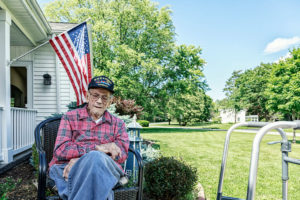Lung Cancer and Veterans
Thousands of military service members were exposed to harmful chemicals and materials, including asbestos. Exposure to these substances has been linked to lung cancer, even decades after the initial exposure and active duty. Veterans who have been diagnosed with lung cancer may be eligible for VA benefits and other forms of compensation.
Do Veterans Have a Higher Risk of Lung Cancer?
Yes. Lung cancer is the leading cause of cancer death in the United States and the leading cause of cancer-related death among military veterans. Research has shown that veterans’ lung cancer incidence is high, meaning veterans are more likely to develop lung cancer.
 An estimated 7,700 veterans each year are diagnosed with lung cancer, according to a report from U.S. Medicine. Veterans’ increased cancer risk is linked to exposure to cancer-causing substances like asbestos and is amplified by smoking.
An estimated 7,700 veterans each year are diagnosed with lung cancer, according to a report from U.S. Medicine. Veterans’ increased cancer risk is linked to exposure to cancer-causing substances like asbestos and is amplified by smoking.
While lung cancer can be devastating, U.S. veterans can seek help after a diagnosis. In fact, veterans with lung cancer may qualify for financial payouts and medical care from the U.S. Department of Veterans Affairs (VA). Veterans may be able to get even more financial payouts through the legal system as well.
If you believe you were exposed to harmful substances during service and have received a cancer diagnosis, our team of patient advocates can connect you with the resources you need. Contact us today for a free case review.
- Access Financial Aid and Justice
- Learn About Your Options
- Contact Us for Free

Mesothelioma and Veterans
Veterans are also at an increased risk of developing mesothelioma, a rare cancer that affects the lining of the lungs and other organs. One-third of all mesothelioma patients are U.S. veterans.
While lung cancer has many possible causes (including asbestos exposure and smoking), mesothelioma is strictly caused by exposure to asbestos. Like lung cancer, symptoms of mesothelioma do not appear until decades after exposure.
Veterans who develop mesothelioma often receive a 100% disability rating from the VA. This means they’re entitled to the highest monthly compensation rates and lowest health care costs.
Veterans at Risk for Other Types of Cancers
Veterans may also be at risk for several other cancers since many of them smoked and were exposed to cancer-causing substances while they served.
- Bladder cancer
- Colon cancer
- Kidney cancer
- Liver cancer
- Prostate cancer
That said, veterans can pursue VA benefits if they developed any of these cancers listed above. They may need to provide evidence that links their diagnosis back to their military service.
What Causes Increased Lung Cancer Risk in Veterans?
Veterans have been exposed to a host of hazardous materials during their military service. Many of these hazardous materials, such as asbestos, Agent Orange, and radon, are linked to developing lung cancer.
While no amount of exposure is safe, veterans are at such an increased risk due to the compound nature of each exposure. Consistent exposure to asbestos coupled with persistent smoking, for example, puts veterans at an even higher risk.
Veterans Asbestos Exposure
Because of its durability, asbestos was heavily used throughout each military branch between the 1930s and the early 1980s.
Asbestos was used for fireproofing, insulating, and reinforcing everything from military plane parts, ship piping, and vehicle brakes. However, inhaling the microscopic asbestos fibers could cause them to get stuck in the lungs, leading to lung cancer or other health problems decades later.
Manufacturers of asbestos-based products learned of the dangers in the 1930s, but concealed the truth to keep making money. As the prevalence of asbestos increased in military and blue-collar occupations, manufacturers of asbestos-based products continued to hide the health risks.
By the 1970s, studies began linking asbestos exposure to mesothelioma and other harmful illnesses. However, millions of people had already been exposed — many of them U.S. veterans.
Smoking
The smoke from cigarettes and other tobacco products is considered the primary cause of lung cancer among veterans and the general population. Smoking is also more common among active military service members likely due to stressful environments and peer use.
Once service members leave active duty, they are likely to persist in smoking from habit and also to deal with residual stress. Approximately 85% of veterans diagnosed with lung cancer report that they are active or former smokers.
Veterans and active military service members who choose not to smoke may also be exposed to secondhand smoke because many fellow service members may continue to smoke. Secondhand exposure to tobacco smoke is still dangerous and linked to an increased risk of lung cancer.
Exposure to Other Toxic Chemicals
Beyond asbestos, service members are exposed to a host of harmful chemicals including radon and Agent Orange.
Radon gas exposure is considered the second most common cause of lung cancer. Radon forms when radioactive materials break down. While the gas will disperse with time, it will release microscopic particles that if inhaled can get stuck in the lungs and cause cancer.
Veterans who served during World War II or were part of nuclear weapon testing might be at an increased risk of developing lung cancer and other illnesses due to radon exposure.
Veterans who served during the Vietnam War may have been exposed to Agent Orange. The toxic substance was used to clear vegetation for military operations on the ground. Agent Orange’s toxic ingredients could enter the body by being inhaled, by eating or drinking contaminated food or water, and even by absorbing into the skin. Even the smallest of traces of the chemical could remain in the body for decades, causing lung cancer and other health issues.
Other veterans who may have been exposed to Agent Orange include those stationed in Thailand, Guam, Cambodia, or other locations between the 1960s and 1970s.
Beyond radon and Agent Orange, the VA lists a number of other hazardous materials veterans may have been exposed to during their service.
These hazardous materials include:
- Contaminated water like that found in Camp Lejeune
- Environmental hazards like those from burn pits, particularly during the Gulf War
- Mustard gas or lewisite
Symptoms of Lung Cancer and Other Asbestos-Related Diseases
Lung cancer symptoms often do not appear until the cancer has started to spread through the body.
- A persistent cough that worsens over time
- Blood in the sputum (mucus that patients cough up)
- Chest pain
- Fatigue
- Shortness of breath or wheezing
- Weight loss
Other symptoms may appear as the cancer spreads into other parts of the body. Veterans experiencing these symptoms should contact their primary care provider immediately. Early detection is critical for lung cancer care.
Symptoms of other asbestos-related diseases are similar to those of lung cancer. If you believe you were exposed to hazardous materials during military service, you may qualify for financial support. Contact our team of patient advocates now to get started.
Military Branches and Occupations Most at Risk of Lung Cancer
Every branch of the U.S. military used asbestos between the 1930s and 1980s. However, veterans of some branches and Military Occupational Specialties (MOS) may be more at risk of lung cancer and asbestos-related diseases than others.
Learn how each branch used asbestos below.
U.S. Air Force
The Air Force relied on asbestos-based products to prevent military aircraft and other assets from catching on fire. Asbestos could be found aboard Air Force planes, buildings, and vehicles.
Jobs within the Air Force most at risk for asbestos exposure include:
- Aircraft mechanics
- Aviation machinist’s mates
- Boiler tenders
- Gunner’s mates
- HVAC specialists
- Pilots
- Plumbers and pipefitters
- Welders
U.S. Army
The most common use of asbestos in the U.S. Army was for vehicle parts such as brakes. Asbestos was also used in construction materials, including cement and paint, found in many Army bases.
These materials could also still be present in various buildings soldiers may come in contact with overseas. When any asbestos-containing materials are damaged, the asbestos fibers are sent into the air, leaving service members at risk of inhaling the toxic material.
U.S. Coast Guard
Like the U.S. Navy, the Coast Guard used asbestos-containing materials to build, fireproof, and reinforce its vessels. In many cases, veterans who worked in boiler rooms, engine rooms, and other areas on Coast Guard ships faced daily exposure to dangerous asbestos fibers.
U.S. Marine Corps
Marine Corps veterans spent significant amounts of time in buildings and vehicles containing asbestos. Like U.S. Army veterans, they may also have come in contact with harmful building materials while overseas. When buildings or vehicles that contain asbestos are damaged, service members are at risk of inhaling asbestos fibers and developing lung cancer later in life.
Marines who were also stationed at Navy bases, shipyards, or aboard Navy ships may also have been exposed to increased levels of asbestos.
U.S. Navy
Veterans who served in the U.S. Navy are most at risk of asbestos exposure. The Navy used more asbestos-containing materials than any other military branch.
In the 1930s, all Navy ships were built with asbestos due to the material’s fireproofing abilities. The ships had poor air circulation, so microscopic asbestos fibers could easily remain in the air for long spans of time.
Unknowingly, service members would inhale the fibers that could eventually lead to lung cancer and other asbestos-related diseases.
Navy shipyards were also incredibly high-risk job sites, as shipyard workers had to remove, install, and repair asbestos-containing materials aboard the ships. All of these activities sent asbestos fibers flying into the air. Nearly 100 shipyards across 11 U.S. states left veterans at an increased risk of lung cancer and other serious illnesses.
Benefits for Veterans With Lung Cancer
Veterans exposed to asbestos and other hazardous materials may be eligible to receive health benefits and compensation from the VA. To gain access to the support you are entitled to, file a VA claim as soon as possible. Lung Cancer Group’s team of patient advocates is also available to help you with the process.
Learn about key VA benefits for veterans with lung cancer and other asbestos-related diseases below.
VA Lung Cancer Screenings and Treatment Options
The VA has several lung cancer screening programs in place to help diagnose veterans with lung cancer in the early stages. Specifically, the VA Lung Precision Oncology Program, a part of the National Precision Oncology Program, aims to give VA clinicians and VA medical centers the resources needed to address and treat early-stage lung cancer proactively.

Veterans with multiple risk factors for lung cancer are prioritized for screenings. These screenings are important as lung cancer is easier to treat if it’s diagnosed in the early stages.
Additionally, veterans who have been diagnosed with lung cancer due to exposures during service may have access to new therapies and clinical trials to support lung cancer treatments.
The VA will provide financial aid to eligible veterans to help pay for lung cancer screenings, treatment options, and immunotherapies, as well as transportation to a VA medical center for specialized care. To secure this support, file your VA claim as soon as possible.
Does Lung Cancer Qualify for VA Disability Benefits?
Veterans may also receive disability compensation for lung cancer and other health problems related to asbestos exposure. Disability benefit amounts are determined by the VA and are paid out every month.
To determine eligibility for VA disability benefits, veterans must show proof of their exposure to asbestos during the VA claims process.
VA Support for Families of Veterans
Family members who care for a veteran diagnosed with lung cancer may qualify for additional VA benefits and monetary support. Family caregivers may apply for the VA’s Program of Comprehensive Assistance for Family Caregivers, which provides mental health counseling, caregiver education, and even possible monthly stipends to support care needs and travel expenses.
Additionally, surviving family members of a veteran who passed away from lung cancer caused by asbestos or other toxic substances may be eligible for compensation and benefits. To learn which benefits you may have access to, contact our patient advocates at Lung Cancer Group.
Help for Veterans Diagnosed With Lung Cancer
The use of asbestos and other hazardous materials has put thousands of veterans at risk of lung cancer. After selflessly serving your country, let us help you get the support and justice you deserve.
Our team can help you secure compensation and VA benefits so you can focus on treatment and spending time with loved ones.
Lung cancer compensation can help pay for:
- Health care costs
- Household bills
- Lost wages
- Other expenses
If you aren’t sure if you were exposed to hazardous materials during your military service, our team may be able to help identify areas of exposure. Call (877) 446-5767 to get the help you need after a lung cancer diagnosis.
FAQs About Lung Cancer and Veterans
Does lung cancer qualify for VA disability?
Possibly, yes. If you were exposed to harmful materials during your service and developed lung cancer, you may be eligible to receive VA disability benefits.
When you file your VA claim, you’ll need to provide documentation that shows how you were exposed to asbestos or other harmful materials. Our team can connect you with some of the best asbestos lung cancer attorneys across the country, who may be able to help you pursue both VA disability benefits and additional compensation.
How do I know if I was exposed to asbestos or other harmful chemicals while serving in the military?
Asbestos products were used in all branches of the U.S. military between the 1930s and 1980s. The products were most commonly used in construction, ships, and vehicles. Additionally, the VA lists 50 military jobs where occupational asbestos exposure was “probable” or “highly probable.”
Because asbestos-containing materials were used so frequently, you may not remember specifically where you might have been exposed. Contact our patient advocates at Lung Cancer Group for help identifying asbestos exposure and determining your options.
Does the VA pay for lung cancer treatment?
Yes, in some cases. The VA may provide financial assistance to cover lung cancer-related expenses and treatment. Veterans diagnosed with lung cancer should submit a VA claim. If you need support, our patient advocates are here to help connect you with a law firm that can help you with the process.
I was diagnosed with lung cancer but have not been on active duty for years. Is my cancer diagnosis still linked to my military service?
Possibly. The symptoms of lung cancer do not appear until decades after exposure to asbestos and other harmful materials. Sadly, no amount of asbestos exposure is safe.
Asbestos products were used so heavily between the 1930s and 1980s that you may not remember specifically where you came in contact with the harmful material. With a database of worksites, Lung Cancer Group patient advocates are prepared to support you. You don’t have to do this alone. Contact our team.
What is the VA 10-year rule?
There are several protections in place for veterans to ensure their disability rating is not lowered and their compensation amount is not altered. The 10-year rule states that a disability rating that has been in place for 10 years cannot be reduced unless there is medical evidence of condition improvement.
After 20 years, the disability rating cannot be reduced by the Veterans Health Administration even if medical evidence shows the condition has improved. Other protections apply to disability ratings of 100%, which many asbestos-related lung cancer diagnoses are rated, and veterans 55 years of age or older.

